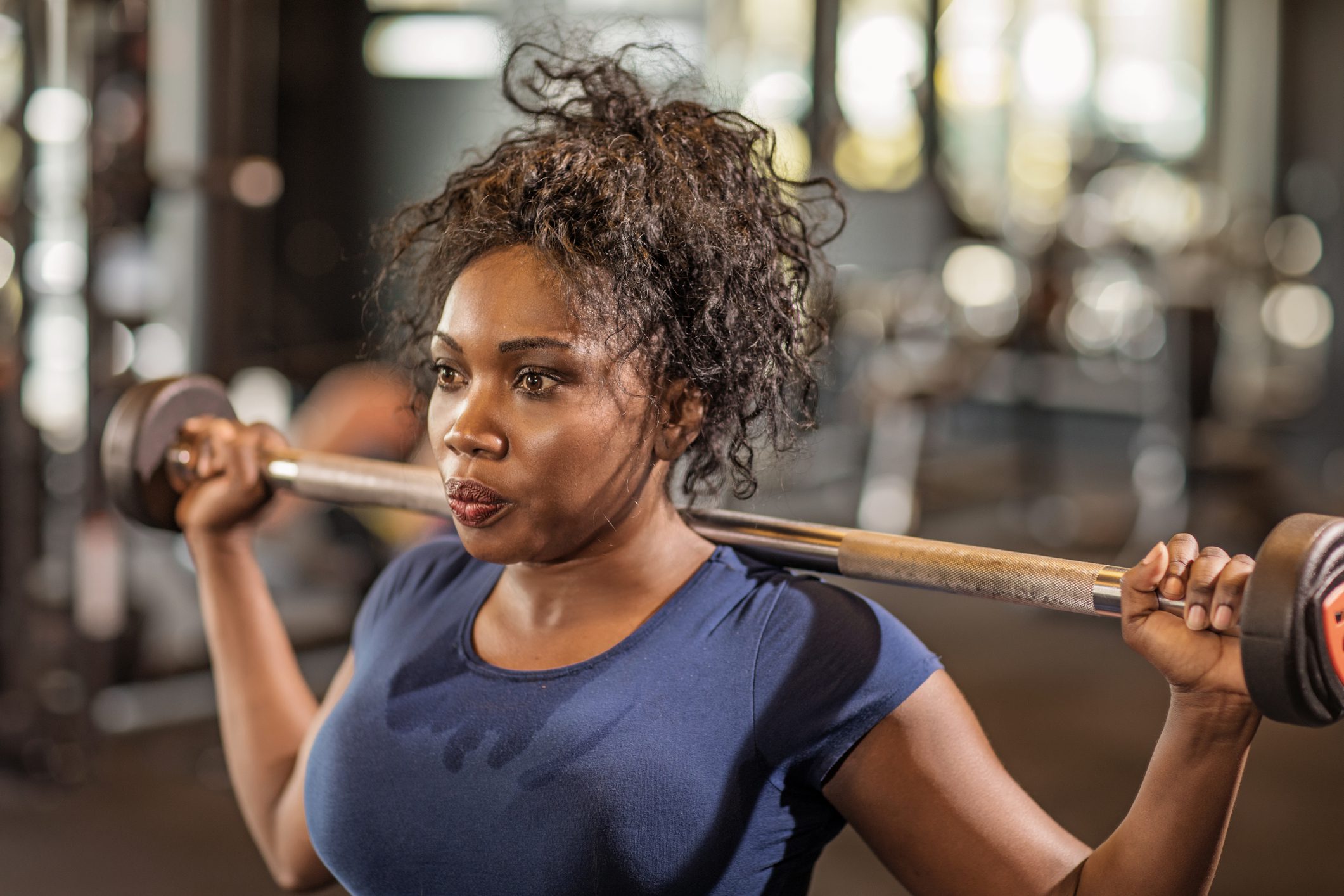Aging can bring with it unique physical challenges. After the age of 30, muscle mass decreases by about 3-8% per decade.1 Bone density also tends to decline, increasing your risk of osteoporosis. During the first five years after menopause alone, you can lose up to 10% of your bone mass.2
Hormonal changes, especially related to menopause, can cause estrogen and other hormones to decline, too. These fluctuations can affect your mood and energy levels, plus losing weight and maintaining a healthy weight can get more difficult.3,4
Resistance training is a key tool to age powerfully and counterbalance these effects. I look at strength training as the fountain of youth, due to its remarkable ability to rejuvenate and maintain physical and mental well-being.
7 Anti-Aging Benefits of Resistance Training
1. Muscle Maintenance and Growth
Think of your muscles as the strong framework that holds up your body. Over time, this framework can weaken if you’re not exercising. The result is reduced muscle tone, weaker muscles, and a less firm appearance. Everyday activities like carrying groceries or climbing stairs can become more difficult.
Resistance training is your secret weapon against the muscle loss that often comes with aging. This type of exercise supports muscle growth, repair, and maintenance.5
Regular strength training lengthens your ability to perform daily tasks that can be more challenging with passing decades. Lifting kids, carrying heavy bags, or maintaining good posture are easier things to do—and for longer. It might not be top of mind right now, but this strength preserves your quality of life so you can remain independent and active as you age.
2. Hormone Balance
As you age, insulin and other hormones are more likely to become imbalanced, increasing your risk of insulin resistance.6
Growth hormone, sometimes called your fountain-of-youth hormone, plays a pivotal role in muscle growth and repair.7 So does testosterone, supporting fat metabolism and overall vitality as well.8 Regularly engaging in strength training optimizes the release of growth hormone and boosts testosterone production.9
Resistance training also has a positive impact on insulin and cortisol, two hormones with significant implications for the aging process. This form of exercise enhances insulin sensitivity, making it easier for your body to process glucose more efficiently and reducing the risk of age-related metabolic conditions like type 2 diabetes.10
Cortisol, your body’s primary stress hormone, can accelerate the aging process when it stays elevated.11 Resistance training helps lower cortisol levels and mitigates the adverse effects of chronic stress. Studies show that regular exercise protects against the negative emotional feelings associated with stress.12
3. Fat Loss
Muscle tissue is metabolically active, meaning it burns calories even when you’re not actively exercising. When you incorporate strength training into your routine, you not only build and maintain lean muscle mass but also significantly increase your resting metabolic rate, or the amount of calories you burn by just existing.
Strength training helps you become a more efficient fat burner by shifting the balance in favor of muscle over fat, improving your body composition. In fact, one study discovered that women who devoted more time and effort to strength training experienced lower body fat levels and higher fat-free mass (basically everything but muscle weight).13
4. Bone Health
Resistance exercises stimulate the activation of bone-building cells, making your bones denser and stronger. Strengthening your bone structure increases stability and lowers the risk of fractures and injuries, leading to a more confident and injury-free daily life.
Research suggests that consistent resistance training can reduce several risk factors for osteoporosis, including improved strength, balance, and muscle mass.14
5. Joint Health
Joints play a crucial role in enabling the smooth movement of your body. However, as you age, the natural wear and tear of joints can lead to discomfort and reduced mobility. This decline often stems from muscle loss and weakening, which results in inadequate joint support.
Resistance exercise plays a key role in building muscle strength and strengthening the ligaments, tendons, and connective tissues that provide crucial stability to your joints.15 The results? Your everyday activities become more manageable. You gain greater freedom of movement, enhanced joint function, and a decreased likelihood of experiencing discomfort or injuries.
6. Brain Health
Resistance training has the potential to help reduce age-related cognitive decline and the risk of conditions like dementia. Strength training can also improve mental well-being, thanks to optimizing neurochemicals like endorphins. Exercise activates these feel-good substances, which alleviate stress, elevate mood, and support a positive mental outlook.16
7. Gut Health
Your gut microbiome, composed of trillions of microorganisms residing in the digestive tract, plays a pivotal role in overall health. Regularly engaging in strength training favorably shifts the composition and diversity of your gut microbiota, promoting a balanced and diverse gut ecosystem.17
A well-balanced and diverse gut microbiome has wide-ranging anti-aging benefits, such as promoting healthier skin, bolstering the immune system, and supporting mental acuity and overall brain health.18
Flora Harmony is a highly potent, shelf-stable, dairy-free probiotic formulation containing 50 billion colony-forming units (CFU). Every serving provides 10 of the most highly researched probiotic strains in a delayed-release capsule, with each strain and specific CFU count fully disclosed.*
Make Strength Training Your Constant Companion
Regular strength training is a powerful anti-aging tool that goes beyond physical strength. It enhances resilience in both body and mind, providing physical and mental strength to confront the challenges of aging. Strength training’s real power lies in nurturing resilience that fosters confidence, determination, and discipline that extends beyond the gym.
I recommend that every woman embrace resistance exercise as a lifelong companion. Resistance training helps you age powerfully, approaching each new stage of life with confidence and vitality.
Ready to start a strength training plan or want to upgrade your current regimen? My FREE Resistance Training Cheat Sheet provides everything you need to get moving, including home gym essentials, an eight-week workout plan, and a progress tracker to track your sets, reps, and weights with each workout.
References:
- Volpi E, Nazemi R, Fujita S. Muscle tissue changes with aging. Curr Opin Clin Nutr Metab Care. 2004 Jul;7(4):405-10. doi: 10.1097/01.mco.0000134362.76653.b2. PMID: 15192443; PMCID: PMC2804956.
- Burrup R, Tucker LA, LE Cheminant JD, Bailey BW. Strength training and body composition in middle-age women. J Sports Med Phys Fitness. 2018 Jan-Feb;58(1-2):82-91. doi: 10.23736/S0022-4707.17.06706-8. Epub 2017 Feb 8. PMID: 28181774
- Kundakovic M, Rocks D. Sex hormone fluctuation and increased female risk for depression and anxiety disorders: From clinical evidence to molecular mechanisms. Front Neuroendocrinol. 2022 Jul;66:101010. doi: 10.1016/j.yfrne.2022.101010. Epub 2022 Jun 15. PMID: 35716803; PMCID: PMC9715398.
- Better Health Channel: Menopause and weight
- McGlory C, Devries MC, Phillips SM. Skeletal muscle and resistance exercise training; the role of protein synthesis in recovery and remodeling. J Appl Physiol (1985). 2017 Mar 1;122(3):541-548. doi: 10.1152/japplphysiol.00613.2016. Epub 2016 Oct 14. PMID: 27742803; PMCID: PMC5401959.
- Karakelides H, Irving BA, Short KR, O’Brien P, Nair KS. Age, obesity, and sex effects on insulin sensitivity and skeletal muscle mitochondrial function. Diabetes. 2010 Jan;59(1):89-97. doi: 10.2337/db09-0591. Epub 2009 Oct 15. PMID: 19833885; PMCID: PMC2797949.
- Better Health Channel: Growth hormone
- Hirschberg AL. Female hyperandrogenism and elite sport. Endocr Connect. 2020 Apr;9(4):R81-R92. doi: 10.1530/EC-19-0537. PMID: 32197237; PMCID: PMC7159262.
- Craig BW, Brown R, Everhart J. Effects of progressive resistance training on growth hormone and testosterone levels in young and elderly subjects. Mech Ageing Dev. 1989 Aug;49(2):159-69. doi: 10.1016/0047-6374(89)90099-7. PMID: 2796409.
- Yegorov YE, Poznyak AV, Nikiforov NG, Sobenin IA, Orekhov AN. The Link between Chronic Stress and Accelerated Aging. Biomedicines. 2020 Jul 7;8(7):198. doi: 10.3390/biomedicines8070198. PMID: 32645916; PMCID: PMC7400286.
- Niemann MJ, Tucker LA, Bailey BW, Davidson LE. Strength Training and Insulin Resistance: The Mediating Role of Body Composition. J Diabetes Res. 2020 May 8;2020:7694825. doi: 10.1155/2020/7694825. PMID: 32455135; PMCID: PMC7235686.
- Childs E, de Wit H. Regular exercise is associated with emotional resilience to acute stress in healthy adults. Front Physiol. 2014 May 1;5:161. doi: 10.3389/fphys.2014.00161. PMID: 24822048; PMCID: PMC4013452.
- Burrup R, Tucker LA, LE Cheminant JD, Bailey BW. Strength training and body composition in middle-age women. J Sports Med Phys Fitness. 2018 Jan-Feb;58(1-2):82-91. doi: 10.23736/S0022-4707.17.06706-8. Epub 2017 Feb 8. PMID: 28181774.
- Layne JE, Nelson ME. The effects of progressive resistance training on bone density: a review. Med Sci Sports Exerc. 1999 Jan;31(1):25-30. doi: 10.1097/00005768-199901000-00006. PMID: 9927006.
- Better Health Channel: Resistance training – health benefits
- Mandolesi L, Polverino A, Montuori S, Foti F, Ferraioli G, Sorrentino P, Sorrentino G. Effects of Physical Exercise on Cognitive Functioning and Wellbeing: Biological and Psychological Benefits. Front Psychol. 2018 Apr 27;9:509. doi: 10.3389/fpsyg.2018.00509. PMID: 29755380; PMCID: PMC5934999.
- Monda V, Villano I, Messina A, Valenzano A, Esposito T, Moscatelli F, Viggiano A, Cibelli G, Chieffi S, Monda M, Messina G. Exercise Modifies the Gut Microbiota with Positive Health Effects. Oxid Med Cell Longev. 2017;2017:3831972. doi: 10.1155/2017/3831972. Epub 2017 Mar 5. PMID: 28357027; PMCID: PMC5357536.
- Hills RD Jr, Pontefract BA, Mishcon HR, Black CA, Sutton SC, Theberge CR. Gut Microbiome: Profound Implications for Diet and Disease. Nutrients. 2019 Jul 16;11(7):1613. doi: 10.3390/nu11071613. PMID: 31315227; PMCID: PMC6682904.
The views in this blog by JJ Virgin should never be used as a substitute for professional medical advice. Please work with a healthcare practitioner concerning any medical problem or concern. The information here is not intended to diagnose, treat, or prevent any disease or condition. Statements contained here have not been evaluated by the Food and Drug Administration.
*These statements have not been evaluated by the Food and Drug Administration. This product is not intended to diagnose, treat, cure, or prevent any disease.






